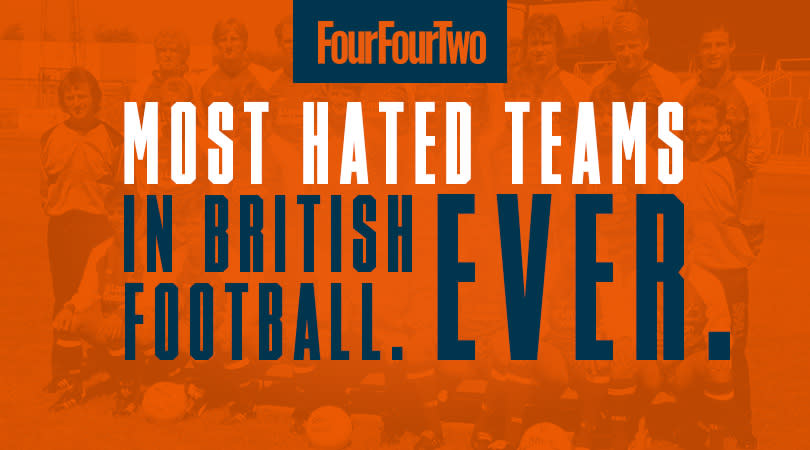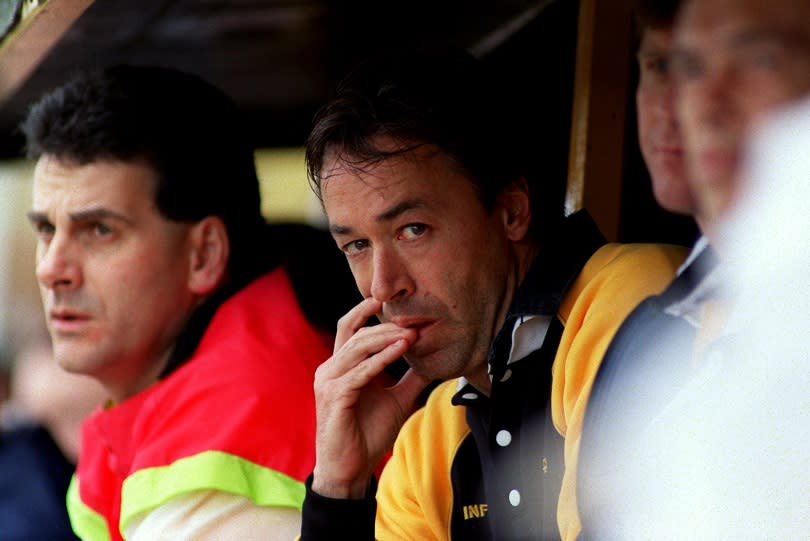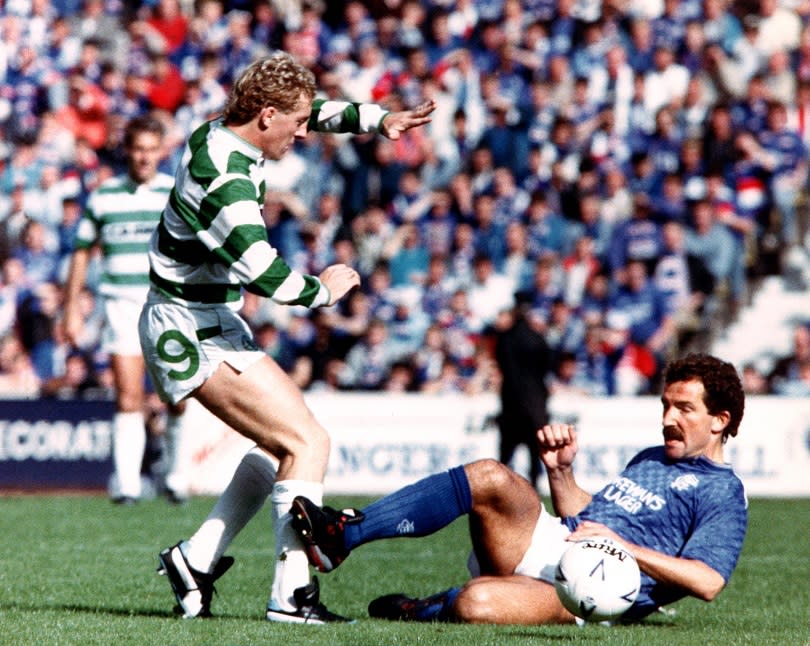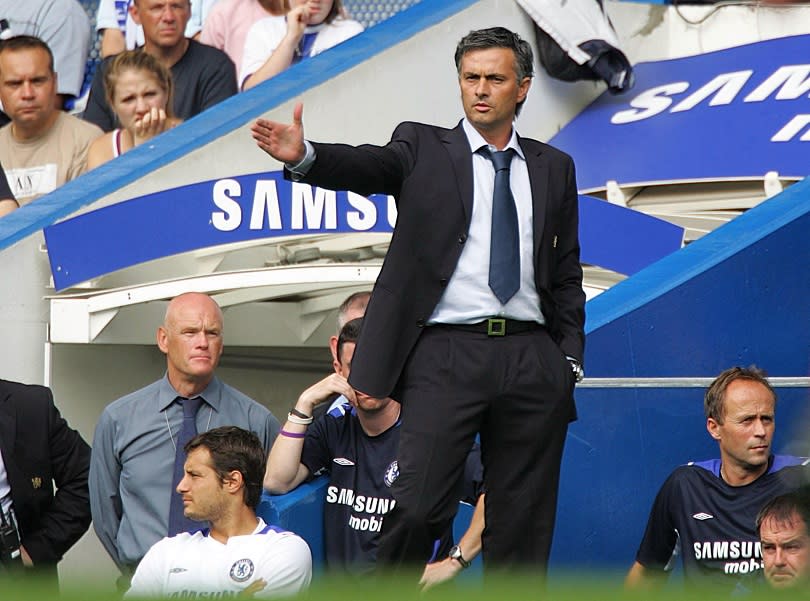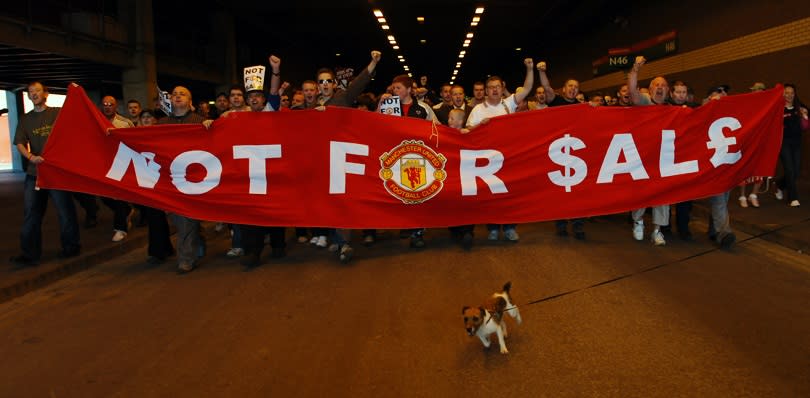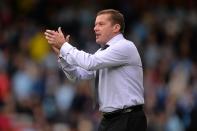Ranked! The 30 most hated ever teams in British football: 20-11
This is part two of our series. To read entries 30-21, click here.
20. Cambridge, 1990-92
Unassuming Cambridge were 14th in the Fourth Division when they hired John Beck in January 1990. By May 1992, they were a play-off win away from the inaugural Premier League. That might seem a pleasant story, but the methodology horrified many: Cambridge were long-ball incarnate.
Cash bonuses were given to players who hit the ball the farthest. Cutting up the centre of the Abbey Stadium pitch to deter the rolling ball, Beck insisted the grass toward the corners be left to grow long, in order to better hold up the hoofs from which wingers would either cross or win a set-piece.
Then there was the psychological warfare. The visitors’ practice balls would be under-inflated or soaked in water, their dressing-room made either crypt-cold or sauna-hot, and sometimes flooded with water for hours beforehand.
Beck was eventually undone by his rigidity. At Christmas 1991, Cambridge were top of the second tier but thereafter saw their increasingly entrenched tactics nullified. When Beck subbed Steve Claridge after 20 minutes for dribbling instead of laying the ball off, a dressing room brawl ensued and the manager was sacked in October 1992. By 1995, Cambridge were back in the basement.
Chief villain: John Beck. Few teams can have been so identified with their manager, and few leaders can have had managerial styles so different to their own playing career. Beck in boots was a skilful creator, but Beck the boss was a fearful Positions Of Maximum Opportunity dogmatist whose idea of motivation was to tack up a poster of Saddam Hussein. In 2013, he was appointed by the FA as a coach educator.
19. Rangers, 1990/91
Before Graeme Souness arrived at Ibrox in 1986, Rangers hadn’t won the title in eight seasons; they then won 10 of the next 11. Bankrolled by David Holmes and David Murray, the player-manager took advantage of English clubs’ post-Heysel ban to attract big-shot Sassenachs like Terry Butcher, Chris Woods, Trevor Steven, Gary Stevens, Trevor Francis and Ray Wilkins. England’s Italia '90 squad had more players from Rangers than any other team.
By 1990, the English clubs were back in Europe and Souness had hung up his boots, but the titles kept rolling in. Souey recruited Millwall tough-nut Terry Hurlock as his replacement and Mark Hateley as a target man alongside Mo Johnston, whose shibboleth-shattering signing – not only an ex-Celtic player, but Gers’ first high-profile Catholic – was perhaps peak Souness vs The World (not bad for a man who planted a Galatasaray flag in Fenerbahce’s centre-circle).
By the time the 1991 title was secured – with a last-day win over rivals Aberdeen – Souness had flitted south to Anfield.
Chief villain: Graeme Souness. Described as “out of order”, “obnoxious” and “difficult to deal with” by none other than himself, as Rangers manager Souness personified how others came to perceive the Glasgow giants: aggressive, arrogant and annoyingly successful.
18. Stevenage, 2003-2006, 2008-2012, 2013-2015
Graham Westley has never cared about winning popularity contests. He had been in charge of Farnborough when their 2003 FA Cup tie with Arsenal was infamously switched to Highbury, but quit soon after to take the Stevenage job and took half of Farnborough’s players with him.
Considered arrogant and outlandish by fans of rival clubs, Westley’s big, ugly side didn’t win many admirers either – although it did produce results. A team combining the physicality of Dino Maamria, Jason Goodliffe and Anthony Elding with the flair of George Boyd reached the Conference play-off final in 2005, but a failure to follow that up 12 months later saw Westley depart.
He had spent almost a year out of football when Stevenage turned to him again – despite some dissent among the home faithful – in 2008. And having used his free time to study the lower leagues, Stevenage under Westley Mk. II thrived, with an FA Trophy triumph in 2009 preceding back-to-back promotions and a spot in the League One play-off places by the time he’d left, again, for Preston in January 2012.
Just 16 wins in 62 games meant Westley’s dalliance at Deepdale lasted little over a year, yet he’d only been out of work a month when Stevenage took him in for a third time. Still in the third tier but on a downward trajectory, Boro ended the campaign in 18th and were bottom a year later. A third sixth-placed finish in five seasons stopped the rot before Westley completed his hat-trick of farewells and the Hertfordshire side hired a safer pair of hands in, erm, Teddy Sheringham.
Chief villain: Dino Maamria. A key ally of Westley, who was later part of his coaching staff at Preston and Newport, the Tunisian forward was sent off four times and cautioned on more than 20 occasions during Westley’s first spell in charge at Broadhall Way.
17. Leicester, 2002/03
Neil Warnock has rarely been afforded the satisfaction of public approval, but the Yorkshireman had many on his side when using his Sheffield United programme notes to attack fellow promotion pushers Leicester back in April 2003.
“I find it quite immoral that they have been allowed to do what they have done off the field,” Warnock fumed, with the Foxes on their way back to the Premier League despite having sunk into administration six months earlier with debts of £30 million.
“Otherwise, everyone who has huge debts will do exactly the same and it leaves clubs like ourselves – who run a tight financial ship – at a huge disadvantage.”
Leicester, crippled by their move to a new stadium the previous August, plus the collapse of ITV Digital which left them bereft of previously-promised millions, had been rescued by a Gary Lineker-led consortium the previous month. Yet with no rules to punish them in existence, the Foxes – working under a transfer embargo – stormed to automatic promotion, 12 points clear of the third-placed Blades.
That all changed soon enough. In April 2003, all 72 Football League clubs met – ironically, at the Walkers Stadium – to vote on implementing rules that would impose sanctions on clubs in administration. Unsurprisingly, Leicester were the only ones to disagree. Everybody else got their wish: by 2004/05, clubs who called in the creditors were docked a minimum of 10 points, which rose to 12 in June 2015. Sixteen League clubs have felt the wrath since.
Chief villain: More of a collective failing that this situation wasn't addressed earlier. But the (unnamed) Leicester City suit who opposed future punishment for clubs that go into administration is really pushing his or her luck.
16. England, 2010
England’s campaign at the World Cup in South Africa would make a great disaster movie. Tactics so stale they had grown mouldy, dissent in the ranks, allegedly world-class players forgetting they had to pass to someone wearing the same shirt; England were, as an unusually enraged Alan Shearer put it, “a team in name only”.
The fact that the Three Lions' 4-1 undoing by Germany had been plotted by a team of PhD students from the German Sports University who spent almost 1,000 hours analysing Fabio Capello’s team (rather them than us) during the build-up to the World Cup only heightens the indignity.
The ancient Greeks believed that hubris was inevitably followed by nemesis (which literally meant ‘folly, ruin, delusion’). This England debacle proved them tragically, hilariously right.
Chief villain: Robert Green fumbled an equaliser into the net against the USA to set the tone for the tournament. The outfield lads, including a huffing Wayne Rooney, who turned out that turgid 0-0 against Algeria didn’t cover themselves in glory either.
15. Arsenal, 1937/38
With just 52 points from 42 games, Arsenal’s haul was the joint-lowest total for league champions. Despite starting the season well, and scoring 12 goals in their first three games, just two wins in 12 followed. Striker Ted Drake later commented: “I didn’t hold out any chance for us, not without Alex James in midfield. To my mind, the quality of player just wasn’t there.” We’re betting Ted was extremely popular in the dressing room.
Media darlings Preston were installed as favourites, but the dogged, and some claimed ‘lucky’, Arsenal clawed themselves back into the race, winning 3-1 at a muddy Deepdale in the season’s defining encounter. The reaction to the news was grudging at best.
Chief villain: He may have scored goals for fun for his team, but striker Ted Drake’s regular spells in the Royal Northern Hospital (“He almost needs a permanent bed there to use whenever necessary,” said manager George Allison) summed up the Gunners’ physical approach to games.
14. Blackburn, 1994/95
Perhaps it was due to the fact they were bankrolled to the title by steel tycoon Jack Walker, but outside Lancashire not too many neutral supporters revelled in Rovers’ 1995 Premier League triumph.
Kenny Dalglish’s team was devastating, direct and effective, perfectly illustrated by their hard-nosed front pairing of Alan Shearer and Chris Sutton, who plundered goals but won few friends. Newly moneyed Blackburn (the first club to transform their quaint old ground into a modern all-seater) lacked flair and artistry, favouring good old Lancashire (well – Boreham Wood to be precise) grit.
Dalglish, keen on signing emerging French midfielder Zinedine Zidane, was famously rebuffed by Jack Walker who – legend has it – responded: “Why do you want to sign Zidane when we have Tim Sherwood?”
Chief villain: To sum up Blackburn’s dour image, striker supreme Alan Shearer told the press that he would be “creosoting the fence” to “celebrate” Rovers’ title victory. Thrilling.
13. Chelsea, 2004/05
The world’s greatest coach (poached at vast expense, with indecent haste), a war chest amassed by a murky Russian billionaire and a squad of brilliant mercenaries recruited from across the globe. What's not to like?
There were many reasons to abhor Chelsea in the Special One’s first season in English football. Ref-bothering Jose Mourinho turned a club who had taken a Bart Simpson-esque pride in flashy underachievement into the most chillingly efficient outfit since the Daleks.
Mourinho’s Blues won the title with a record 95 points (12 clear of runners-up Arsenal) and conceded just 15 – fifteen! – goals. They’ve only recently, thanks to even-more-minted Manchester City, been able to shake off some of the ‘Chelski’ stigma.
Chief villain: Peter Kenyon. The ultimate mercenary, and he wasn’t even a player. While they loved Mourinho, few Chelsea fans could stomach the ‘lifelong Manchester United fan’ and director’s presence at Stamford Bridge.
12. Manchester United, 2009/10
A survey of 1,000 Brits around this time found that Manchester United were more unpopular than Ryanair. The explanations given included: United’s wealth; Gary Neville; myths about elastic injury-time and the dearth of penalties conceded at Old Trafford; Sir Alex Ferguson’s power; Gary Neville; monotonous, monopolistic success; the club’s apparent belief that just because you’re paranoid doesn’t mean the FA isn’t plotting against you; and Gary Neville. Must we go on?
Then came the takeover by the Glazer family and, in 2009/10, even United’s own fans turned on the club (or at least the way it was being run). Protests led to supporters donning so much green and gold – as worn by forerunners Newton Heath – that Old Trafford looked like an advert for Irish butter.
Chief villain: Gary Neville. The man opposition fans loved to hate (but secretly admired). Whisper it, but some United die-hards were also disappointed that the great Ferg himself didn’t do more to set himself against the Glazer takeover.
11. Arsenal 2003/04
The Invincibles weren’t all that - not a patch on Preston North End, and with a nasty streak that would have shocked the Victorians.
It’s not that we’re jealous of their success. Honest. And of course there were moments of brilliance from the likes of Thierry Henry. Yet although they went the league season unbeaten, they did it with 12 draws – and their total of 90 points was bettered by Mourinho’s Chelsea in each of the next two seasons.
Everyone wanted to beat them. They rode their luck at times too - most notably against Portsmouth in September of that season, when Robert Pires dived to win a penalty in a 1-1 draw. They were also fortunate to escape unscathed from the infamous ‘Battle of Old Trafford’ 10 days later, which led to seven players being fined. Patrick Vieira was sent off, and Ruud van Nistelrooy crashed a last-minute penalty against the bar, sparking scenes that doubled as Martin Keown’s audition for Rise of the Planet of the Apes.
Chief villain: Plenty to choose form here - Pires for his diving, Keown, Henry for just being so good it was basically unfair. But one man probably edges it - the truly awful Jens Lehmann.
You think this lot weren't popular? See our top 10 hated British teams here

 Yahoo Sport
Yahoo Sport 






































